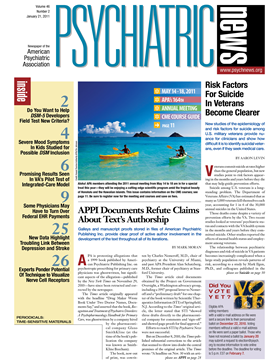APA is objecting to a proposal by the Social Security Disability Insurance (SSDI) program to change the criteria it uses to evaluate whether people with mental disorders qualify for benefits. APA is concerned that many people with serious mental illness could be denied coverage.
SSDI provides aid to people who “are unable to achieve gainful employment due to a permanent disabling condition,” according to the SSDI Web site.
The Social Security Administration (SSA), which administers the SSDI program, proposed the changes in August 2010. They would allow SSDI administrators to use standardized tests to determine whether an applicant's health condition interferes with his or her ability to function “independently, appropriately, effectively, and on a sustained basis in a work setting.” Currently, no such tests are used to evaluate the workplace functioning of SSDI applicants.
Although the Bazelon Center for Mental Health Law, APA, and other mental health advocates support the development and subsequent use of standard test measures of work-related functioning, they oppose the implication that such measures already exist.
“The inclusion of references to standardized tests in the [proposed] rule clearly sends the message that there are tests that can measure [work impairment], when in fact there are not,” wrote Chris Koyanagi, policy director for the Bazelon Center, in a letter to the SSA on November 30, 2010. “This will likely result in the use of existing tests that are valid for clinical purposes but that are not appropriate for measuring a person's ability to function in a work situation.”
The proposed changes could lead local SSDI administrators to view other evidence of applicants' disability-related work impairments “as more subjective and then [be] dismissed or given less weight, even though it may be more valid,” Koyanagi wrote.
APA Medical Director James H. Scully Jr., M.D., expressed his objections as well. In a letter dated November 17, 2010, he said, “Without additional development and assessment, the clinical, scientific, and psychometric foundations of employing such [clinical] tests for disability determinations are unreliable, and their interpretation by adjudicators may be inadequate and unfair to applicants with mental illnesses.”
Problems stemming from the use of clinical tests to determine work-related impairment could include use of terms such as “mild” or “moderate” in the context of diagnoses, which do not necessarily translate to mild or moderate limitations in job functioning, wrote Catherine Callery, a staff attorney for the Empire Justice Center, a New York advocacy group, and colleagues, in a letter to the SSA on November 15, 2010.
The extent of the potential impact of tightened eligibility requirements can be seen in the annual report from the SSA Research, Statistics, and Policy Analysis Division. The latest report, issued in July 2010, noted that only 798,354 of the 3.3 million SSDI beneficiaries classified as having a “mental disorder” were mentally retarded. About 2.5 million were diagnosed with qualifying psychiatric disorders and could be subject to clinical tests to determine their ability to work.
“This change would drastically reduce the number of children and adults with serious mental disorders who qualify for disability benefits,” Koyanagi told Psychiatric News.
Other proposed changes to SSDI rules, however, were strongly supported by APA and other mental health advocates. Those changes included adding more mental health conditions to the list of qualifying health impairments, including dementia, schizophrenia, mood disorders, anxiety disorders, somatoform disorders, personality disorders, autism spectrum disorders, and eating disorders.
A final decision on the proposed changes is expected sometime this year.
